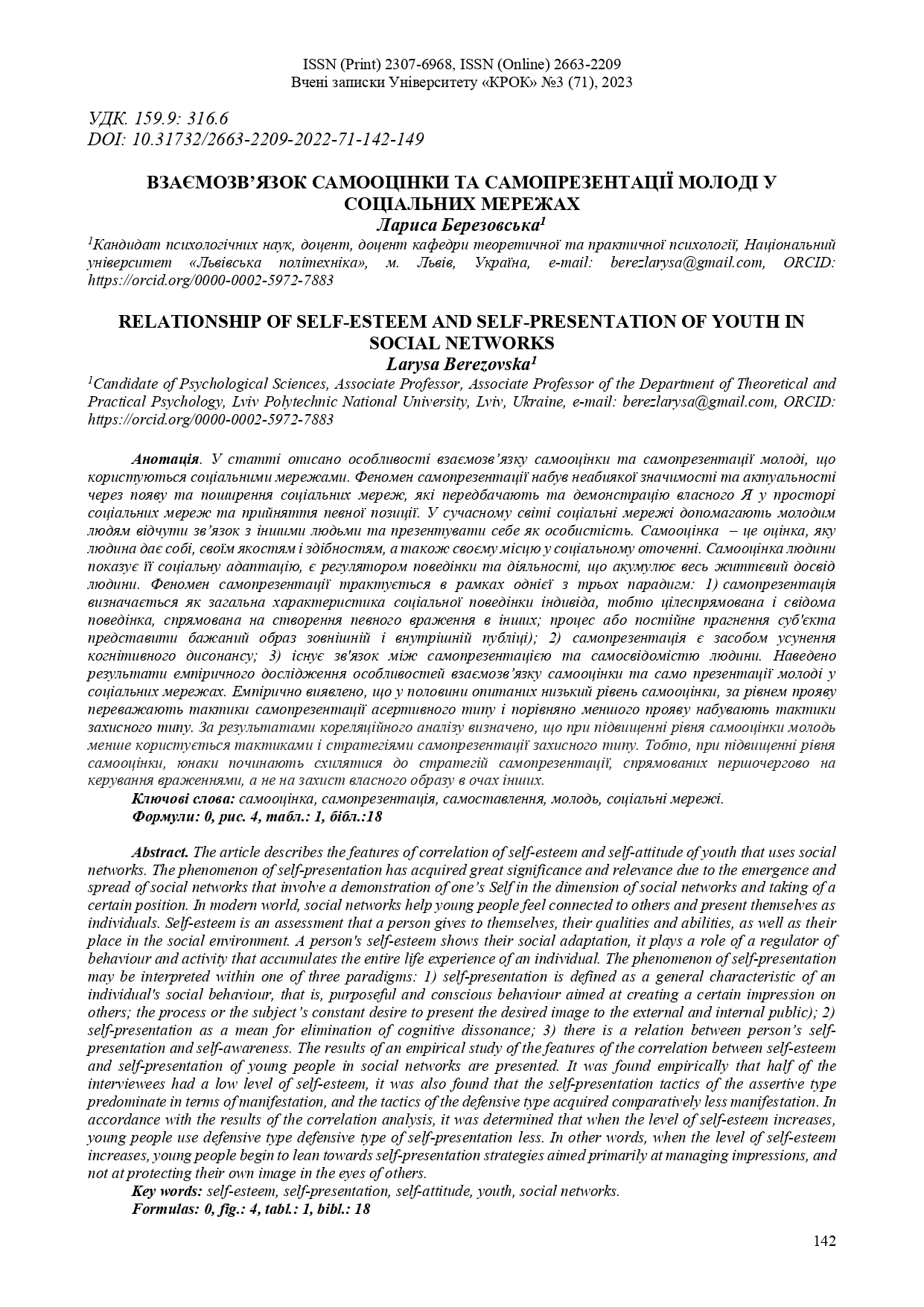ВЗАЄМОЗВ’ЯЗОК САМООЦІНКИ ТА САМОПРЕЗЕНТАЦІЇ МОЛОДІ У СОЦІАЛЬНИХ МЕРЕЖАХ
DOI:
https://doi.org/10.31732/2663-2209-2022-71-142-149Ключові слова:
самооцінка, самопрезентація, самоставлення, молодь, соціальні мережіАнотація
У статті описано особливості взаємозв’язку самооцінки та самопрезентації молоді, що користуються соціальними мережами. Феномен самопрезентації набув неабиякої значимості та актуальності через появу та поширення соціальних мереж, які передбачають та демонстрацію власного Я у просторі соціальних мереж та прийняття певної позиції. У сучасному світі соціальні мережі допомагають молодим людям відчути зв’язок з іншими людьми та презентувати себе як особистість. Самооцінка – це оцінка, яку людина дає собі, своїм якостям і здібностям, а також своєму місцю у соціальному оточенні. Самооцінка людини показує її соціальну адаптацію, є регулятором поведінки та діяльності, що акумулює весь життєвий досвід людини. Феномен самопрезентації трактується в рамках однієї з трьох парадигм: 1) самопрезентація визначається як загальна характеристика соціальної поведінки індивіда, тобто цілеспрямована і свідома поведінка, спрямована на створення певного враження в інших; процес або постійне прагнення суб'єкта представити бажаний образ зовнішній і внутрішній публіці); 2) самопрезентація є засобом усунення когнітивного дисонансу; 3) існує зв'язок між самопрезентацією та самосвідомістю людини. Наведено результати емпіричного дослідження особливостей взаємозв’язку самооцінки та само презентації молоді у соціальних мережах. Емпірично виявлено, що у половини опитаних низький рівень самооцінки, за рівнем прояву переважають тактики самопрезентації асертивного типу і порівняно меншого прояву набувають тактики захисного типу. За результатами кореляційного аналізу визначено, що при підвищенні рівня самооцінки молодь менше користується тактиками і стратегіями самопрезентації захисного типу. Тобто, при підвищенні рівня самооцінки, юнаки починають схилятися до стратегій самопрезентації, спрямованих першочергово на керування враженнями, а не на захист власного образу в очах інших.
Завантаження
Посилання
Бондар, Н. Є., Бондар, Ю. І., & Дубовська, К. М. (2012) Психологічні особливості самопрезентації студентської молоді в соціальних мережах інтернет. Науковий часопис НПУ імені М. П. Драгоманова. Серія 12 : Психологічні науки. Вип. 37. 261-266.
Диса, О. С. (2018) Особливості самопрезентації у соціальних мережах. Проблеми формування громадянського суспільства в Україні : матеріали Всеукр. наук.-практ. конф. (м. Дніпро, 12 квітня 2018 р.). Дніпро : ДДУВС, 2018. 81-83
Краснякова, А. О. (2016) Інтернет-середовище як новий комунікативний простір самопрезентації особистості. Наукові студії із соціальної та політичної психології. Вип. 38. 286-297.
Тканова, В. В. (2022) Особистісна самопрезентація сучасної молоді у соціальних мережах. Актуальні проблеми психології в закладах освіти, 7, 140–144.
Huang, W. (2018) Analysis on Self-presentation in Internet Social Media. 3rd international social sciences and education conference. 19–22.
Zarghooni, S. A (2007) Study of Self-Presentation in Light of Facebook. – [Електронний ресурс]. – https://zarghooni.files.wordpress.com/2011/09/zarghooni-2007- selfpresentation_on_facebook.pdf
Ляховець, Л.О., Лісневська, А.О. (2020) Особливості само презентації юнаків-користувачів мережі Instagram. Теорія і практика сучасної психології. 1 (2). 89-94.
Березова, Д.О. (2021) Я-образ як фактор самопрезентації в соціальних мережах у менеджерів по роботі з клієнтами. Національний авіаційний університет. Київ. Режим доступу: https://dspace.nau.edu.ua/handle/NAU/54144
Вислоух, І.С. (2021) Самопрезентація у соціальних мережах як елемент стратегії пошуку роботи. Національний авіаційний університет. Київ. Режим доступу: https://dspace.nau.edu.ua/handle/NAU/51665
Колеснікова, Т.В., Сингаївська, І.В. (2020) Психологічні передумови формування іміджу сучасної жінки в соціальних мережах. Держава, регіони, підприємництво: інформаційні, суспільно-правові, соціально-економічні аспекти розвитку: тези доповідей ІІ Міжнародної конференції (Київ, 20 листопада 2020 р.). К.: Університет «КРОК». 44–46.
Настояща, К. В. (2019) Практики самопрезентації в інтернет-просторі: форми і тенденції . Науково-теоретичний альманах «Грані». 22 (1). 20-28
Duffy, B., Pruchniewska, U., Scolere, L. (2017) Platform-specific self-branding: Imagined affordances of the social media ecology. 8th International International Conference on Social Media and Society. 5. 1–9.
Вавілова, А.С. (2021) Стратегії самопрезентації дорослих та підлітків у соціальних мережах. Науковий вісник Херсонського державного університету. Психологічні науки (2). 14-21.
Макогончук, Н.В. (2022) Соціальні мережі та передумови хибної самопрезентації особистості у Facebook. Особистість та суспільство в цифрову еру: психологічний вимір ІІІ Міжнар. наук.-практ. конф. (м. Одеса, 24 черв. 2022 р.). Нац. ун-т «Одес. юрид. акад.». Одеса: Національний університет «Одеська юридична академія». 141-144.
Кутішенко, В.П., Ставицька, С.О. (2009) Психологія розвитку та вікова психологія: Практикум: навч. посіб. К.: Каравела.
Капустюк, О.М. (2007) Самопрезентація як засіб створення позитивного іміджу особистості. Проблеми загальної та педагогічної психології. 2. 95–102.
Зелінська, Т.М., Михайлова, І.М. (2009) Практикум із загальної психології: Навч.посібн. К.:Каравела.106-108.

Downloads
Опубліковано
Як цитувати
Номер
Розділ
Ліцензія

Ця робота ліцензується відповідно до Creative Commons Attribution-NonCommercial 4.0 International License.

